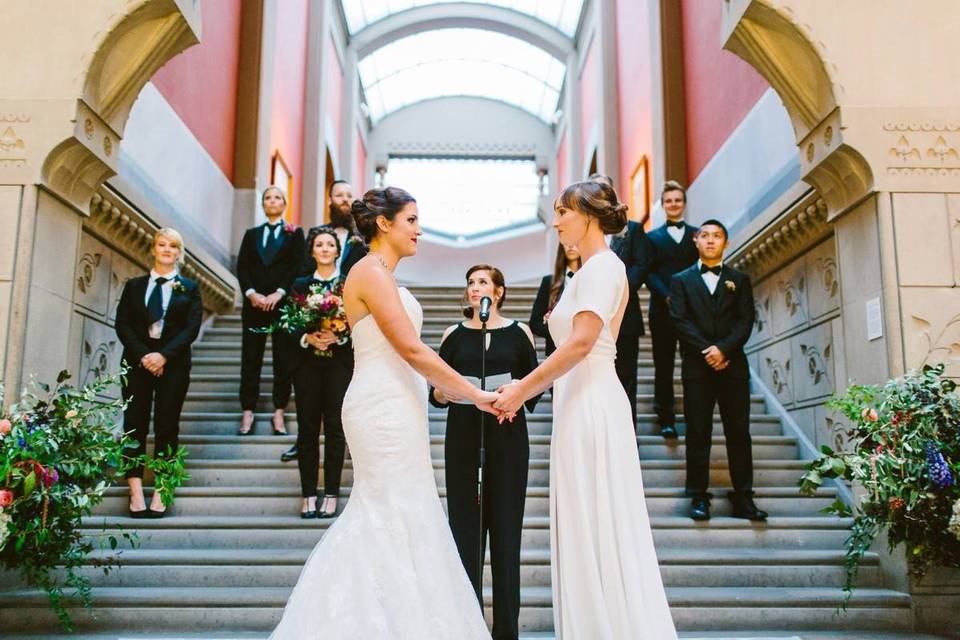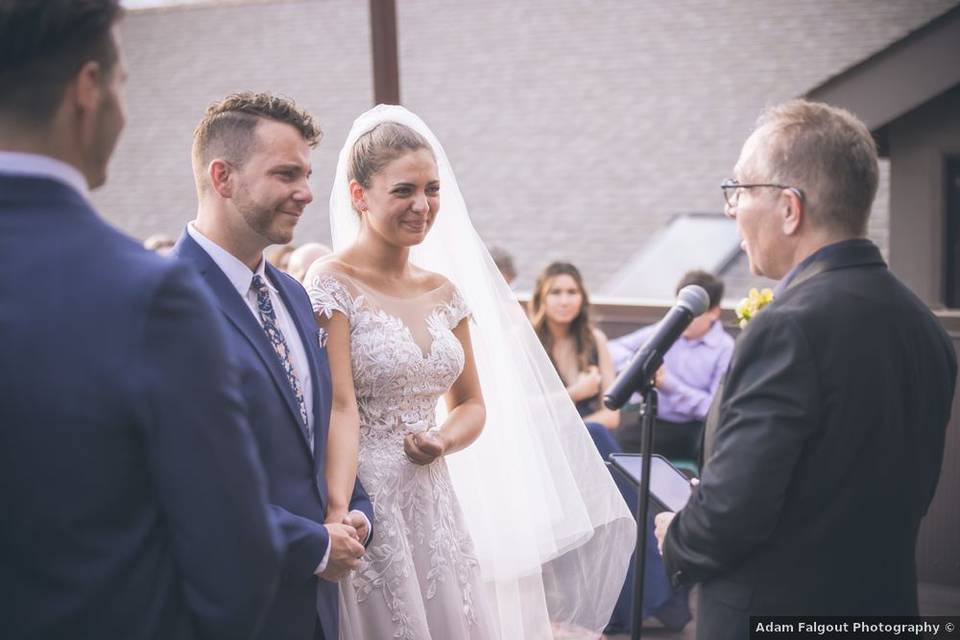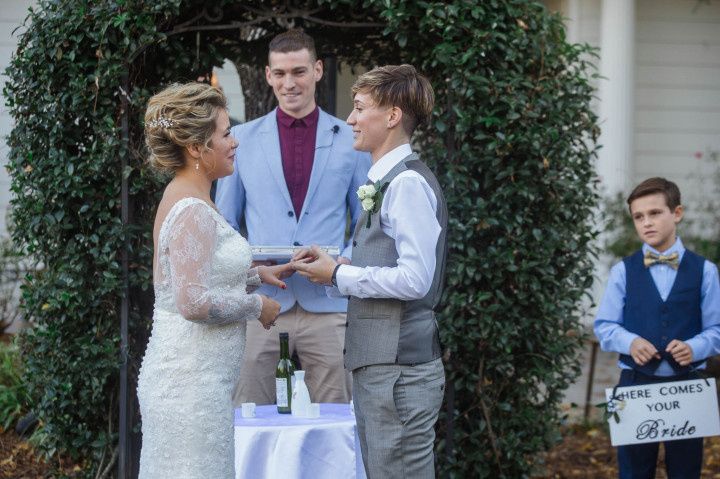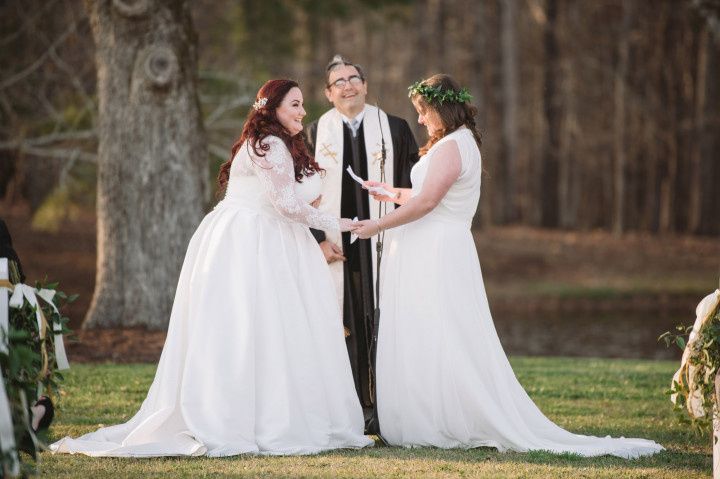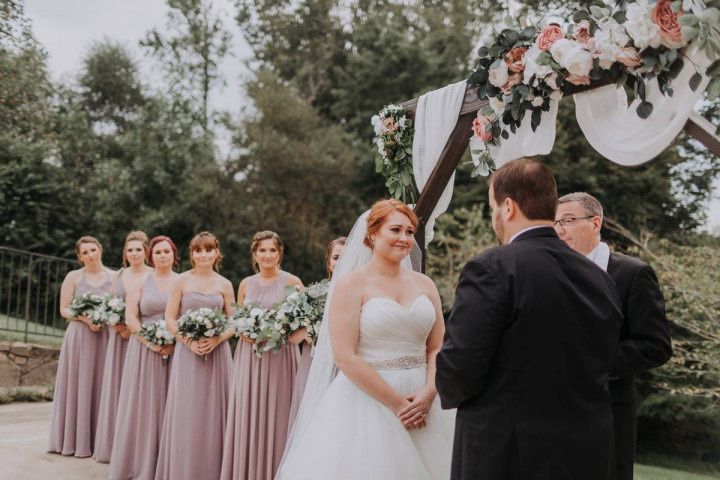What are Wedding Vows? Here's Everything You Need to Know
Wondering what are wedding vows? This guide explains everything you need to know about the exchange of vows and how they differ based on religion.
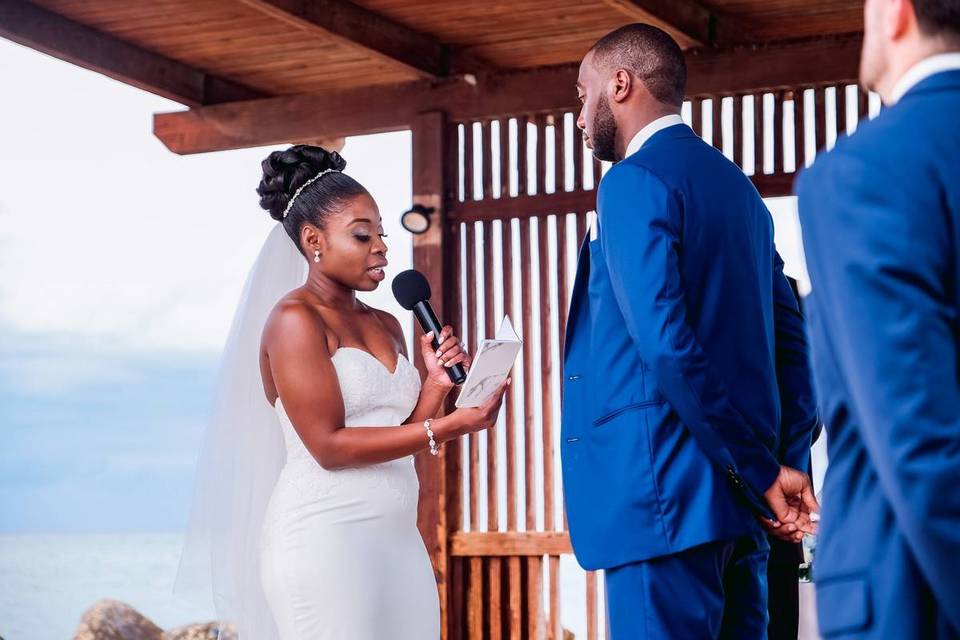
We’ve seen it in a million wedding movies—during the ceremony, a couple recites a bunch of words to each other, ending in “’til death do us part”, then they kiss, and are officially married. But what are wedding vows and why do couples have to recite them during the ceremony? And what’s the deal with writing your own wedding vows—can you actually do that? We’re here to help answer all of your wedding-vow-related questions, and help figure out which type of wedding vow is right for your big day. So, what are wedding vows? Get ready for your crash course!
Wedding Vows 101
So, what are wedding vows? Most simply, marriage vows are the promises two people make to each other during a wedding ceremony. These promises can look different across religions, as well as from couple to couple. You’re basically declaring your lifelong commitment to your spouse, witnessed by your loved ones (here are some examples!). Vows can be romantic and emotional, of course, but can also be humorous—it all depends on your style and the structure of your ceremony, as determined by your officiant.
Vows typically take place after your officiant’s sermon or any religious readings you choose to have. You will generally exchange rings immediately following the vows, with the pronouncement of marriage and the kiss following that.
You may be most familiar with the traditional Catholic wedding vows (these are the ones most commonly recited in movies): “I, [name], take you, [partner’s name], for my lawful wife/husband, to have and to hold from this day forward, for better, for worse, for richer, for poorer, in sickness and health, until death do us part.”
Wedding vows can be recited in three different ways. If you and your partner write your own vows, you will be speaking directly to one another.
Another option is to repeat the vows after your officiant, which can alleviate some of the pressure associated with reciting vows. For example:
Officiant: “Please repeat after me. I, Laura, take thee, Susan,”
Laura: “I, Laura, take thee, Susan.”
Your third option to declare, “I do,” to your officiant who recites vows in a question-answer format. For example:
Officiant: “Do you, Cameron, you take this man to be your lawfully wedded groom?”
Cameron: “I do.”
How do wedding vows differ across religions and cultures?
Catholic
There are two sets of American Catholic wedding vows that are approved by the Vatican—work with your priest to determine which one is best for you and your ceremony. If you’re hosting a Catholic wedding, it’s unlikely that you will be able to write your own vows.
Jewish
Traditionally, there is no exchange of vows in a Jewish ceremony – the wedding ritual presumes the promises. The vows occur when the groom puts the ring on his partner’s finger and utters the words, “you are consecrated to me with this ring according to the laws of Moses and Israel.”
Protestant
Each of the different Protestant churches has its own wedding vows. Whether you’re Episcopalian, Methodist, Presbyterian, or Lutheran, you’ll want to talk to your officiant to find out the appropriate vows for your denomination.
Hindu
One of the most important Hindu wedding rituals is Saptadi, or Seven Steps. These are promises that the couple makes to each other as they enter into marriage.
Muslim
Most Muslim ceremonies do not include vows. The couple will typically listen to their imam’s words about marriage, and are then asked if they accept the terms of their marriage. In some cases, Muslim couples can recite vows to each other.
Eastern Orthodox
In most Eastern Orthodox traditions, no vows are spoken during the ceremony. Symbolic rituals are used in place of the spoken vows.
Unitarian
Unitarian wedding vows can be fairly flexible and left up to the minister to determine the exact wording.
What is the declaration of intent?
Once you and your partner have made promises to each other in the form of vows, there’s another part of the ceremony—the declaration of intent. Especially if you are writing your own vows, it’s important to keep in mind that the declaration of intent is legally required to pronounce you married. The vows are comprised of promises, but the declaration typically follows right after the vows. It’s when the couple takes each other’s hands and exchange the “I do’s.” The officiant prompts the two lovebirds, and the bride and groom (or bride and bride, or groom and groom), respond with “I do,” or sometimes, an “I will.” It should go without saying, but you should plan this part of the wedding in advance with your officiant.
Should we write our own vows?
While writing your own vows is a great way to personalize your ceremony, you don’t have to go this route. In particular, if you’re having a religious ceremony that has a stricter ceremony script and structure, you may not be able to personalize your vows. If writing your vows is really important to you and you can’t make it part of your official ceremony, feel free to do a separate, more intimate ceremony where you declare your own vows – it can even be just you and your partner, before or after the larger ceremony. You’re making the promise to cherish your partner forever, and most importantly, that should never be taken lightly.
Is it okay to read your personal wedding vows as opposed to memorizing them?
While it’s certainly preferable to memorize your wedding vows, we actually recommend having a copy of your vows in hand at your ceremony so you can read them if need be. Unless you’re a professional performer or are adept at public speaking, you’ll probably be pretty nervous before reciting your vows—so it’s better to have a printed copy of your vows in front of you for easy access. You can even write your vows (neatly!) in a designated vow book to add a prettier, personalized touch.
How long should wedding vows be?
When recited out loud, wedding vows should be between one and two minutes long—which is about 100 to 200 words when read at a slow pace. To test out how long your vows will be, practice reading them aloud in front of a mirror (loudly, slowly, and clearly, please) and adjust the text length accordingly.
Do you have to say your vows in front of everyone?
If you like the idea of writing personal vows to your partner but are terrified at the thought of reciting them in front of all of your loved ones, fear not! You can simply repeat the standard vows after your officiant, and recite your personal vows in a more private setting—for example, during your first look or after the ceremony. If you’re okay reciting your personal vows in front of a smaller group, you might opt to do an informal exchange of vows at your rehearsal dinner.

